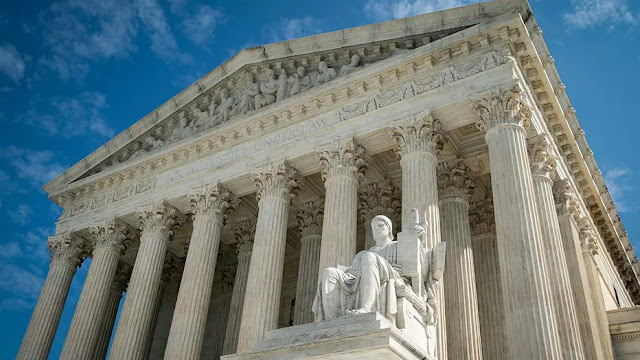The Supreme Court will hear arguments this week in several high-stakes cases, including a dispute over tribal healthcare programs and a landmark hearing that could determine the scope of access to the common abortion pill.
The highlight of the week will be on Tuesday in a pair of consolidated cases against the Food and Drug Administration‘s actions over the abortion drug mifepristone, which in 2016 made changes to allow the pill to be more widely accessible by online order or mail delivery.
While the dispute does not deal with abortion laws specifically, it marks another contentious case over the matter less than two years since the high court ruled to overturn Roe v. Wade and allow states to impose laws severely restricting or limiting abortion access.
Here is a look at the high court’s week ahead:
Justices take up tribal healthcare circuit split
On Monday, the justices will weigh Becerra v. San Carlos Apache Tribe to determine whether tribes can sue the federal government for administrative expenses related to third-party insurers such as Medicare or Medicaid — a dispute that has divided federal appellate courts.
The Indian Self-Determination and Education Assistance Act gives tribes the ability to run their own healthcare programs with funding from the Indian Health Services, which is under the Department of Health and Human Services.
The question for the justices is whether the IHS should also reimburse tribes for additional administrative expenses tied with third parties.
A 2021 ruling from the U.S. Court of Appeals for the D.C. Circuit found the IHS was not responsible for the costs, but the 10th Circuit ruled differently, prompting the federal government to tap the justices to resolve the split.
Following those arguments, the justices on Monday will tackle Harrow v. Department of Defense, which asks whether it is permissible to waive the 60-day deadline for requesting an appellate court to review a decision by the Merit Systems Protection Board, which handles federal employment claims.
Next stage of abortion fight heads to high court steps
On Tuesday, the justices will convene for a potentially landmark hearing over a legal fight about access to the common abortion pill, which began in November 2023 when a group of religious doctors who oppose chemical abortions sued to reverse the FDA’s 2000 approval of the drug.
U.S. Judge Matthew Kacsmaryk, an appointee of former President Donald Trump in the Northern District of Texas, made an unprecedented ruling last April to suspend the FDA’s approval of the pill completely, the first time a court has suspended a medication’s approval after rejecting the assessment of a human drug by the FDA.
A three-judge panel on the U.S. Court of Appeals for the 5th Circuit issued a ruling agreeing with Kacsmaryk only in part, a decision that still sharply curtailed access to the drug.
That decision, if allowed by the Supreme Court to take effect, would pare back actions the FDA has taken since 2016 to make the pills more accessible, including regulations on allowing mail delivery, pharmacy dispensing, and online ordering of the drug. Danco Laboratories, the makers of mifepristone, is arguing alongside the FDA to keep these accessibility changes in place.
The cases are known as FDA v. Alliance for Hippocratic Medicine and Danco Laboratories, L.L.C. v. Alliance Hippocratic Medicine, both of which will be consolidated into one hearing.
Justices review criminal firearm ‘occasions’ clause
On Wednesday, the high court will consider whether juries, rather than judges, are required to find certain facts that would trigger 15-year mandatory minimum sentences for criminal gun possession.
The Armed Career Criminal Act sets a mandatory minimum sentence and potential life sentence if a defendant has three previous qualifying convictions that were “committed on occasions different from one another.”
Justices left the question open in the 2022 case Wooden v. United States, but both the defendant involved and the federal government now contend it should be decided by the high court.
The case is Erlinger v. United States.
Also on Wednesday, the justices will hear Connelly v. Internal Revenue Service, a case that questions whether the proceeds of a life insurance policy taken out by a closely held corporation on a shareholder constitutes an asset of the company when factoring in the value of the shareholder’s shares for federal estate tax purposes.
The U.S. Court of Appeals for the 8th Circuit created a split with the 11th Circuit, which separately held that life insurance proceeds paid pursuant to an obligation to redeem shares do not raise the value of the company’s stock.





.jpg)



.png)


